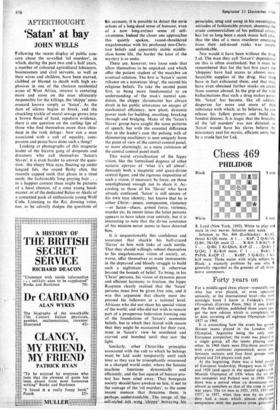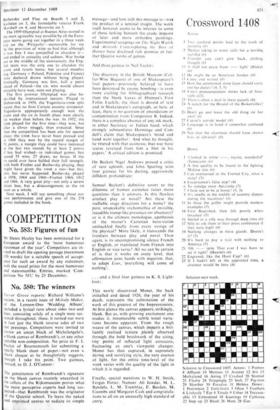Chess 469
PHILIDOR
S. Loyd (New York, 1892). White to play and mate in two moves. Solution next week.
Solution to No. 468 (Loshinsky): Kt-B2. threat Kt-Q6 mate. A 1 . s . KxP; 2 Q-Kt7ch. Q-B6; 3Kt-Q6 mate (2 . . . K-K4; 3 B-Kt7). 1 . . . Q-B4; 2 Kt-Q6ch, KxP (2 . QxKt; 3 Q-Q4); 3 Kt-Kt4 mate. C 1 . . PxPch, KxQP (2 . . . KxBP; 3 Q-Kt2); 3 K.,- Kt4 mate. Three mates with triple selfpin to, Black; a masterly problem by one who is generally regarded as the greatest of all three- move composers.
Forty years on
For a middle-aged chess player—especially on who has ever played, or even spectate_ seriously, at the international level—the nto< nostalgic book I know is Foldeak's Olympiads (Corvina Press, 30s); if you didn get the first edition, published three years ago. get the new edition which is completely up to date, covering all eighteen Olympiads from 1927 to 1968.
It is astonishing how the event has grown Sixteen teams played in the London 192 Olympiad, Argentina being the only non- European competitor; the event was played in a single group, all the teams playing each other. In 1968 there were fifty-three countries. with every continent represented; seven pre- liminary sections and four final groups were played and 314 players took part. At the beginning, there was a brief period of European leadership; Hungary won in 192, and 1928 (and again in the special eight-a-side Munich Olympiad of 1936 when the us did not compete) and Poland won in 1930. Then there was a period when us dominance W3-3 almost as complete as that of the USSR in post' war years. The us won in 1931, 1933, 1935 and 1937; in 1937, when they won by six poinn they had a team which almost' challenge) comparison with the postwar USSR galaxies-
Reshevsky and Fine on Boards 1 and 2, Kashdan on 3, the formidable veteran Frank Marshall on 4, and Horowitz on 5.
The 1939 Olympiad at Buenos Aires started in the most. agreeable way possible by all the Euro- pean teams going out together in a three week trip on the Piriapolis'—memorable for me by the provision of wine so bad that although it was free I was compelled to abandon it— and ended in unreality and sadness. War broke out in the middle of the tournament; the Eng- lish team was the only one to abandon the event and return home, but several matches (e.g. Germany v Poland, Palestine and France) were declared drawn without being played. Ironically, Germany was first, half a point ahead of Poland—the us, who would almost certainly have won, were not playing.
The first postwar Olympiad was also be- devilled by international tension. Played in Dubrovnik in 1950, the Yugoslavia-ussa split meant that no Iron Curtain country competed. Yugoslavia appropriately enough won the event and the us in fourth place were clearly far weaker than before the war. In 1952, the USSR played for the first time—they won, but after a closer struggle than expected. Since then the competition has been one for second place; the USSR have never been pressed and in 1968 they won by the record margin of 81 points, a margin they could have increased in the last two rounds by at least 2 points if hey had wished—in individual games. hey Jeered 53 wins, 27 draws, no losses. If the us could ever have fielded their full strength, with both Fischer and Reshevsky playing, they might have given the USSR a run—but this, alas, has never happened. Reshevsky played in 1958, 1964 and 1968—Fischer 1960, 1962 and 1966. A very great pity—not only a severe direct loss,. but -a discouragement to the us team as a whole.
Next week, I will say something about our own performance and give one of the 254 games included in the book.















































 Previous page
Previous page